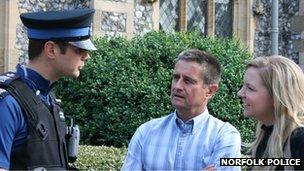Police and crime commissioner elections: Norfolk
- Published

Norfolk is the safest county in England, according to statistics
On 15 November, 37 police and crime commissioners will be elected in England along with four in Wales.
The PCCs, as they will be known, will be tasked with scrutinising their force and holding it to account. They will also be able to hire and dismiss the chief constable and set the force's budget.
The commissioners will be paid and are supposed to empower local people into having a say on how crime is tackled in their area.
Nominations for candidates in Norfolk have now officially closed.
BBC News has taken a look at each of the police forces ahead of the elections.
Norfolk Police
Norfolk Constabulary monitors crime in the predominately rural county, which is the fifth largest in England and has a population of 858,000.
Police also have to deal with an influx of holidaymakers during the summer to its coastal resorts and the Norfolk Broads, which has its own specialist Broads Beat.
The constabulary's main priorities for 2012 to 2015 are to reduce re-offending, priority crimes and anti-social behaviour, improve levels of service satisfaction and sustain financial stability.
Norfolk Police is led by Chief Constable Phil Gormley, with Simon Bailey, who looks after performance and standards, second in charge.
Departments in the force monitor community safety, criminal justice and royalty protection, with the Queen's Sandringham Estate based in the west of the county.
Norfolk and neighbouring Suffolk Police also collaborate on many tasks, including major investigations and campaigns.
Funding
Norfolk Police's budget for 2012 was set at £145m by Norfolk Police Authority.
The constabulary, which has about 1,500 officers, has been put under pressure to save £25m between 2011 and 2014 and it aims to reduce officer posts by between 150 and 250 over the period.
Instead of opting to take a government grant, the authority increased the council tax precept towards the police in February to 3%, which saw about a 0.4% rise in the public's tax bill.
It said the move was to protect as many services as it could throughout the budget cuts.
The force hopes to save at least £9.8m by merging its support services, including human resources, media and communications and estates and facilities, with Suffolk Police.
Crime and performance
Despite the range of crimes the force has to deal with, Home Office figures show Norfolk is the safest county in England, with a rate of 50 crimes per 1,000 residents.
This compares to the country's average of 66 per 1,000.
According to January statistics, Norfolk Police is also detecting more crimes than ever, with the force having the sixth highest detection rate in England.
Deputy Ch Con Simon Bailey said: "For the majority of crime categories, Norfolk has seen reductions. Where there have been increases, we have looked at why this may be the case and the analysis proves helpful in understanding the bigger picture.
"There are some categories of crime that people are reluctant to report. These are often related to domestic violence and we are actively working to encourage people to report these crimes so we can better understand them and, ultimately, take measures to break the cycle."